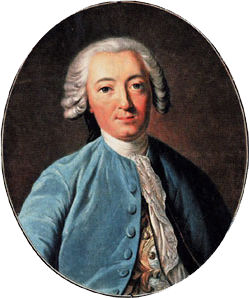Claude Adrien Helvétius foi um filósofo e literato francês.
Filho de um médico de Luís XV, estudou com os jesuítas no colégio Louis-le-Grand. Aos 23 anos, obteve o cargo de caseiro geral, com uma boa renda que lhe permitiu levar uma vida sem problemas, frequentando os meios literários e artísticos. Casando-se, retirou-se para o campo, onde se dedicou à literatura. Hesitou muito tempo antes de encontrar o gênero literário que lhe convinha, até apresentar sua obra filosófica Do espírito.
Devido sobretudo ao seu anticlericalismo, o livro foi condenado por uma carta apostólica do papa Clemente XIII, em 1759. Com isso, Helvétius resolveu nada mais publicar.
Em 1764 foi à Inglaterra e, no ano seguinte, à Prússia. A amizade com o enciclopedista Jean le Rond d'Alembert abriu-lhe as portas da Academia de Berlim. Deixou diversas obras publicadas postumamente, entre elas: Verdadeiro sentido do sistema da natureza e Do homem, das faculdades intelectuais e de sua educação. Este último, aliás, foi condenado pelo parlamento francês e queimado.
Influenciado pelas ideias de John Locke e Condillac, Helvétius pretendeu ampliar o empirismo às questões morais e políticas. Considerava que todas as ideias eram apenas afecções dos sentidos, não havendo qualquer faculdade especial de reflexão que fosse distinta das sensações. Essa fonte única de todo conhecimento servia de base para a doutrina ética e social segundo a qual todos os homens eram iguais e teriam as mesmas aspirações. Todos os comportamentos humanos seriam fundamentados no interesse - impulso para a obtenção do prazer e a eliminação da dor. Através da educação, os homens deveriam ser levados a fazer com que seus interesses individuais coincidissem com os interesses da coletividade. Mas para isso era indispensável combater os grandes obstáculos constituídos pelas superstições e preconceitos religiosos, fomentados, segundo Helvétius, pelo egoísmo da classe sacerdotal.
✵
26. Janeiro 1715 – 26. Dezembro 1771
